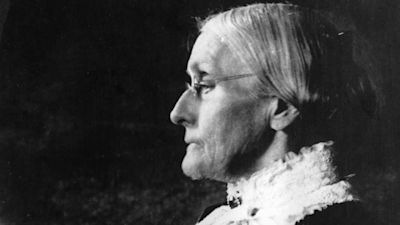Who was Susan B Anthony the suffragette pardoned by Donald Trump?

US President Donald Trump will pardon Susan B Anthony, a leader in the women’s suffrage movement who was arrested for voting in 1872.
Ms Anthony is best known for her role in the movement to secure voting rights for women, but she also was a strong anti-slavery and voting rights pioneer.
Her vote was made in violation of laws permitting only men to vote.
“She was never pardoned,” President Trump said on Tuesday.
“What took so long?”
He said he would sign “a full and complete pardon” later on Tuesday.
Mr Trump’s pardon comes 100 years after the ratification of the 19th Amendment, which gave women the right to vote. It’s also known as the Susan B Anthony Amendment.
His move also comes amid an outcry over Postal Service disruptions that Democrats say endanger the voting rights of millions of Americans who would vote by mail in November amid the pandemic.
Mr Trump has denied asking for the post to be delayed even as he levelled fresh criticism on mail-in voting.
Ms Anthony was arrested for voting in her hometown of Rochester, New York, and convicted in a widely publicised trial. Although she refused to pay the fine, the authorities declined to take further action.
Her defiance against the patriarchy and drive for gender and racial equality has given her legendary status in the US.
But who was the trailblazer and why were her actions so important in the history of the US?
Susan Brownell Anthony was born on February 15, 1820 in Adams, Massachussetts and raised as a Quaker.
Her mother, Lucy, came from a family that fought in the American Revolution.
She was taught that everyone was equal under God from an early age, and this inspired her later activism against slavery and for women’s rights.
Many of her seven siblings became activists for the emancipation of slaves.
Her activism
Ms Anthony moved to New York State after many years of teaching, according to the National Women’s History Museum, and there she grew her desire to do more for the emancipation of slaves.
She would co-found the American Equal Rights Association and made “many speeches” against slavery – despite it being considered improper for women to give public speeches.
“She became famous throughout the county. Many people admired her, yet others hated her ideas,” the museum added.
In 1869, she co-founded the National American Woman Suffrage Association.
Her activism became part of the movement that ultimately led to the abolition of slavery in 1865 and to the 14th and 15th amendments, which permitted men of any race to vote.
Crucially, however, neither amendment made mention of women, which is why Ms Anthony opposed the legislation.
But that wouldn’t stop her claiming what should have been her democratic right.
Arrested for voting
On November 18, 1872, Ms Anthony was arrested for voting in the front parlour of 7 Madison Street (now 17 Madison).
She was tried and fined $100 after a judge ordered a jury to find her guilty.
Ms Anthony refused to pay but was not imprisoned so could not appeal the verdict, according to the National Susan B Anthony Museum & House.
She continued to give speeches and lectures – and she even met with President Theodore Roosevelt in 1905 about submitting a suffrage amendment to Congress.
She would die a year later in 1906, shortly after her “failure is impossible” speech given on her 86th birthday celebration.
What is her legacy?
In 1920, the 19th Amendment to the US Constitution, also known as the Susan B Anthony amendment, granted the right to vote to all women over 21.
The 19th Amendment states that: “The right of citizens of the United States to vote shall not be denied or abridged by the United States or by any State on account of sex”.
Congress passed it in 1919, and the amendment was ratified on August 18, 1920.
Visiting Anthony’s grave site in Rochester on Election Day has become a popular ritual in recent years.
Thousands turned out in 2016 for the presidential match-up between Mr Trump and Hillary Clinton.
In 2018, voters showed up by the dozens to put their “I Voted” stickers on her headstone.